Joe Simon - Come On And Get It (Sound Stage 7 2628)

Come On And Get It
When it comes to soul music, the Tennessee city that gets all the press is, of course, Memphis. Now that Solomon Burke's new album has everyone talking about Nashville, I figured we'd take a look at the soul roots of 'music city'.
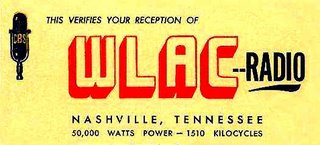 First of all, it's hard to overestimate the influence of Nashville radio station WLAC. With 50,000 watts of 'clear-channel' power, its broadcast signal could be heard all over North America. By the mid-fifties, the station's format had become an eclectic mix of Blues, Gospel and Rhythm & Blues that was tailored to their mostly black audience. With over 30 states within the range of their transmitter, it was estimated that WLAC was listened to by over 65% of the African-American people in this country. Although the dee-jays on the station were white, their laid-back 'southern drawl' had many people convinced otherwise. They, of course, did nothing to dispel that notion.
First of all, it's hard to overestimate the influence of Nashville radio station WLAC. With 50,000 watts of 'clear-channel' power, its broadcast signal could be heard all over North America. By the mid-fifties, the station's format had become an eclectic mix of Blues, Gospel and Rhythm & Blues that was tailored to their mostly black audience. With over 30 states within the range of their transmitter, it was estimated that WLAC was listened to by over 65% of the African-American people in this country. Although the dee-jays on the station were white, their laid-back 'southern drawl' had many people convinced otherwise. They, of course, did nothing to dispel that notion. The greatest of these dee-jays was one John Richbourg, known on the radio as simply 'John R'. His late night broadcasts from 'way down south in Dixie' developed an almost fanatical following, as people tuned in to hear what was new and happenin' on the R&B scene. He 'broke' many a new record on his show, featuring up and coming artists like Chuck Berry and B.B. King. James Brown has said that John R. was the man who "started his career" by getting behind the Famous Flames' Please, Please, Please at a time when nobody else would play it. He would go on to do the same for Otis Redding, 'staying on' These Arms Of Mine for months until his listeners 'got it'. Above all else, it was his taste in music, his unerring sense of what made a good record, that kept him so popular. For a whole new generation of white kids (like Dan Penn and Phil Walden) who were staying up late and listening to the radio, John R. was their barometer, their window into the taboo world of 'negro music'.
The greatest of these dee-jays was one John Richbourg, known on the radio as simply 'John R'. His late night broadcasts from 'way down south in Dixie' developed an almost fanatical following, as people tuned in to hear what was new and happenin' on the R&B scene. He 'broke' many a new record on his show, featuring up and coming artists like Chuck Berry and B.B. King. James Brown has said that John R. was the man who "started his career" by getting behind the Famous Flames' Please, Please, Please at a time when nobody else would play it. He would go on to do the same for Otis Redding, 'staying on' These Arms Of Mine for months until his listeners 'got it'. Above all else, it was his taste in music, his unerring sense of what made a good record, that kept him so popular. For a whole new generation of white kids (like Dan Penn and Phil Walden) who were staying up late and listening to the radio, John R. was their barometer, their window into the taboo world of 'negro music'. Fred Foster, a former A&R and promotion man for Mercury and ABC-Paramount, came to Nashville and started his MONUMENT label in 1958. Although he initially met with some resistance from the 'local music establishment' (who claimed he was 'polluting Nashville with his bastard music'), his reputation as a man who kept his word (and payed his studio musicians on time) helped him build up the label. When Foster produced Roy Orbison's Only The Lonely for Monument in 1960, the record shot to #2 and put them both on the map. For the next four years, Orbison's records kept them in the top ten, and brought in enough income for Foster to expand his company, and eventually buy his own studio. His focus remained primarily on 'quirky' singer-songwriters like Harlan Howard, Tony Joe White, and Kris Kristofferson, as he stayed true to his motto "Monument Is Artistry".
Fred Foster, a former A&R and promotion man for Mercury and ABC-Paramount, came to Nashville and started his MONUMENT label in 1958. Although he initially met with some resistance from the 'local music establishment' (who claimed he was 'polluting Nashville with his bastard music'), his reputation as a man who kept his word (and payed his studio musicians on time) helped him build up the label. When Foster produced Roy Orbison's Only The Lonely for Monument in 1960, the record shot to #2 and put them both on the map. For the next four years, Orbison's records kept them in the top ten, and brought in enough income for Foster to expand his company, and eventually buy his own studio. His focus remained primarily on 'quirky' singer-songwriters like Harlan Howard, Tony Joe White, and Kris Kristofferson, as he stayed true to his motto "Monument Is Artistry". After he released a few R&B records on Monument, the radio people went nuts. "As it turned out, a lot of jocks would put a Monument record on the air without auditioning it. Some of these country guys - well not really country, 'chicken-rock' I call them, played low-profile music, and suddenly they put on this screaming R&B record... their phones lit up!", Foster said. As a favor to them, he created his Sound Stage 7 label in 1963 to serve as an outlet for his black artists. After The Dixiebelles went top ten with Down At Papa Joe's, and top twenty with the follow-up Southdown U.S.A. in 1964, nothing much else seemed to be happening with the label.
After he released a few R&B records on Monument, the radio people went nuts. "As it turned out, a lot of jocks would put a Monument record on the air without auditioning it. Some of these country guys - well not really country, 'chicken-rock' I call them, played low-profile music, and suddenly they put on this screaming R&B record... their phones lit up!", Foster said. As a favor to them, he created his Sound Stage 7 label in 1963 to serve as an outlet for his black artists. After The Dixiebelles went top ten with Down At Papa Joe's, and top twenty with the follow-up Southdown U.S.A. in 1964, nothing much else seemed to be happening with the label. Foster, in a stroke of brilliance, turned to the one man in Nashville that had his finger on the pulse of black music, John R. He gave him 'complete control' of A&R for the label, and free reign in the studio, with production on all Sound Stage 7 releases being handled by J.R. Enterprises.
 Joe Simon was born in Louisiana, but grew up in Oakland. As a teenager, he sang with The Golden West Gospel Singers, a group that would later change its name to The Golden Tones and record for the west-coast based Hush label in 1959. Joe had a few releases on the label himself in the early sixties, before being picked up by Vee-Jay in 1964. He had some moderate success with records like Adorable One, before John R met him and suggested to Vee-Jay that they take him down to Muscle Shoals to record. The resulting Let's Do it Over was a smash hit in the Summer of 1965, spending 17 weeks on the charts. When Vee-Jay went bankrupt later that year, John R. wasted no time in signing Simon to Sound Stage 7.
Joe Simon was born in Louisiana, but grew up in Oakland. As a teenager, he sang with The Golden West Gospel Singers, a group that would later change its name to The Golden Tones and record for the west-coast based Hush label in 1959. Joe had a few releases on the label himself in the early sixties, before being picked up by Vee-Jay in 1964. He had some moderate success with records like Adorable One, before John R met him and suggested to Vee-Jay that they take him down to Muscle Shoals to record. The resulting Let's Do it Over was a smash hit in the Summer of 1965, spending 17 weeks on the charts. When Vee-Jay went bankrupt later that year, John R. wasted no time in signing Simon to Sound Stage 7.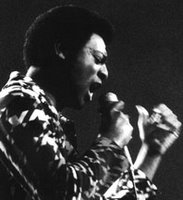 Joe's lush voice was the perfect vehicle for the 'country soul' that John R had in mind, and his records charted consistently for the label. Today's selection was actually used as a B side twice - as the flip for No Sad Songs in early 1968, and monster hit The Chokin' Kind in 1969. I guess John R was trying to tell us something, as it's just about as funky as it gets... with Joe repeating 'come on, come on, come on, come on' there towards the end, while the band just cooks - yeah, baby! The song, co-written with the great Allen Orange, who had left Toussaint back in New Orleans to become John R's in-house composer and arranger, is just pure soul. While the flip was recorded at the fabled Music City studio in Nashville, I'm not sure if today's B side was or not, as it's from a year earlier... it sure has that Muscle Shoals vibe to it, though (...detectives?) [Ed. Note 1/7: Be sure to check out the awesome 'comment' from Bob Wilson (co-writer of today's selection) that gives detailed session information about this great song and confirms that, just as we suspected, it was recorded at FAME in Muscle Shoals].
Joe's lush voice was the perfect vehicle for the 'country soul' that John R had in mind, and his records charted consistently for the label. Today's selection was actually used as a B side twice - as the flip for No Sad Songs in early 1968, and monster hit The Chokin' Kind in 1969. I guess John R was trying to tell us something, as it's just about as funky as it gets... with Joe repeating 'come on, come on, come on, come on' there towards the end, while the band just cooks - yeah, baby! The song, co-written with the great Allen Orange, who had left Toussaint back in New Orleans to become John R's in-house composer and arranger, is just pure soul. While the flip was recorded at the fabled Music City studio in Nashville, I'm not sure if today's B side was or not, as it's from a year earlier... it sure has that Muscle Shoals vibe to it, though (...detectives?) [Ed. Note 1/7: Be sure to check out the awesome 'comment' from Bob Wilson (co-writer of today's selection) that gives detailed session information about this great song and confirms that, just as we suspected, it was recorded at FAME in Muscle Shoals]. Anyway, The Chokin' Kind, which had been written by Monument's own Harlan Howard and covered earlier that year by Waylon Jennings, went straight to #1 R&B and won Simon a Grammy that year, becoming forever his 'signature song'. The combination of John R's production and Joe's smokey vocals made for the perfect marriage of Country and Soul, something that people are still trying to get their minds around today (witness all the hooplah surrounding the Solomon Burke record....).
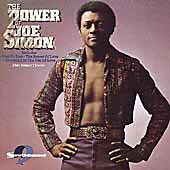 Simon, although remaining virtually a stranger to the 'pop' charts, would become a huge star in the black community, and is ranked #32 of Whitburn's top 500 R&B artists. After 7 more singles with Sound stage 7, John R was instrumental in getting Joe signed with funk powerhouse Spring Records in late 1970. Although John continued to work with him, it was his Gamble & Huff produced sides that would put Simon back at the top of the charts repeatedly throughout the decade.
Simon, although remaining virtually a stranger to the 'pop' charts, would become a huge star in the black community, and is ranked #32 of Whitburn's top 500 R&B artists. After 7 more singles with Sound stage 7, John R was instrumental in getting Joe signed with funk powerhouse Spring Records in late 1970. Although John continued to work with him, it was his Gamble & Huff produced sides that would put Simon back at the top of the charts repeatedly throughout the decade.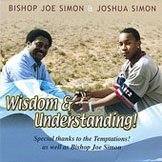 After a few dissapointing releases on the Posse label in the early eighties, Joe Simon turned his back on popular music and returned to the Church. He continues to record an occasional Gospel album (as Bishop Joe Simon), and by all reports, is still in great voice. Although it is Charley Pride that most people think of when you say 'Black Country', Joe Simon's Nashville records should put him right up there as well.
After a few dissapointing releases on the Posse label in the early eighties, Joe Simon turned his back on popular music and returned to the Church. He continues to record an occasional Gospel album (as Bishop Joe Simon), and by all reports, is still in great voice. Although it is Charley Pride that most people think of when you say 'Black Country', Joe Simon's Nashville records should put him right up there as well.John R was honored at a Grand Ole Opry benefit to help defray the costs of his lung cancer treatments in 1985. Everyone from B.B. King and James Brown to Rufus Thomas praised him as a giant whose pioneering work in the early days of R&B changed the face of music in this country. Weak and confined to a wheelchair, with his distinctive radio voice reduced to a quiet whisper, all John could do was mumble 'thank you' through his tears. The man who had been described as a 'white cat with a black soul' passed away at age 75 in February of 1986.
As he used to say, "It's all on record!".
___________________________________________________________________ 10/19/06
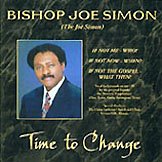 The good ladies at Roya/Chessboy Records dropped me a line to let me know about Bishop Joe Simon's most recent album, Time To Change. It's been released in conjunction with his Community Crusade, and you can listen to a few tracks here.
The good ladies at Roya/Chessboy Records dropped me a line to let me know about Bishop Joe Simon's most recent album, Time To Change. It's been released in conjunction with his Community Crusade, and you can listen to a few tracks here.Check it out!


















10 Comments:
Wow! Ain't that a hot Friday night song! Fan me!
Love me some Joe Simon, Red. Nice. Hadn't heard it before. I think you are probably right that this track was done in Muscle Shoals, if it's from 1968. The notes in one of my CD comps on Joe suggest that and say John R didn't start exclusively recording him in N'ville until the "Chokin' Kind" session. I agree this B-side has the MS vibe.
Another obscure Simon side I especially dig is "It's A Miracle" (Hush 103) from the early 1960's - sounds just like ska!
Great story about the origins of Sound Stage 7 and about John R and Joe Simon. I need to do another "Country Soul Special" so I can get some more Joe Simon in there!
Thanks, Jason -
I know you're a big 'nashville soul' guy... I first heard the great MOON WALK over at your place. Great stuff!
I also just got the UK Charly 3 CD set The Sound Stage 7 Story... HIGHLY RECOMMENDED, y'all!
I am the co-writer of this cut with Joe Simon and Allen Orange. I was an Artist, Session Musician, Arranger and Songwriter for Sound Stage 7 records. I played Organ on this cut. It was recorded at Fame Studios in Florence, Alabama. The track was arranged by myself, Rick Hall and the talented Aaron Varnell. Aaron did the horn arrangement and played tenor sax on the cut. We had to wait to use the studio for them to finish an all-night session for Wilson Pickett. It was recorded on either an Ampex 2 track or 3 track analog tape recorder. Joe was hot on the vocal, with a funky soul-scream and a pleading: "Come on-Come on, Come on-Come on. Roger Hawkins was the drummer and David Hood played bass. It was released as a b-side on 3 different singles. And was cut after Joe's hits "Teenager's Prayer" and "My Special Prayer". Allen Orange and I wanted to cut Joe in a more Funk type sound, but the label wanted to develop him as a more "middle of the road/Pop" artist. This was one of his original funk type cuts. I played keyboard on 90% of Joe's hits with Sound Stage 7 and was a songwriting partner with Allen Orange on about 20 songs, but this was one of my favorites.
Bob Wilson.
Wow!
Thank you so much, Bob, for the scoop on this great record! I apologize for not mentioning you as a co-writer in the original post but, to be honest, I had no idea who the 'B. Wilson' on the label was (other than the fact that it probably wasn't 'Brian'). Now we know!
After being kind of pointed in the right direction, I found these listed in the Sound Stage 7 discography over at Soulful Kinda Music:
2570 – Bob Wilson – Conception / In The Midnight Hour – 1966
2578 – Bob Wilson – After Hours / Suzy’s Serenade – 1966
Boy, I'd love to hear those... anybody out there have copies? I've also found reference to a session man named Bob Wilson who played on Dylan's Nashville Skyline album... 'zat you too?
Bob, if you ever get back here and read this, please email me: redkelly@optonline.net
...I'd love to speak with you about those days!
Thanks Again!
-red
I have a question. I cam across a record produced by J.R. Enterprises. The label has Sound Stage 7 on it. This 45 also has on the label Disc Jockey Not For Sale on it.
The song is called, That's All I Want From You (M. Rothe-F Rotter) and I Can't turn Her Loose (A.Ornage). There is another name on the label Sam Baker. Could this be one of his productions?
Hi there -
The 45 in question was indeed a J.R. Enterprises production, in this case arranged by Dan Penn at American Sound in Memphis. Sam Baker is the singer, and quite a wonderful one at that! A superb retrospective of his Sound Stage 7 singles has just been released: I Believe In You on Soundscape. You can also read more about Sam here and in the latest issue of In The Basement.
He's one of the all time greats.
Thanks for stoppin' by!
I love this song from way back. Thanks for posting it.
11.23.08
Hello, just stumbled upon your site through google.
I used to listen to this song all the time, thanks for posting it and thanks for a great article.
I wish they still made music like this
Post a Comment
<< Home